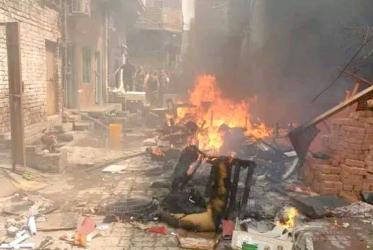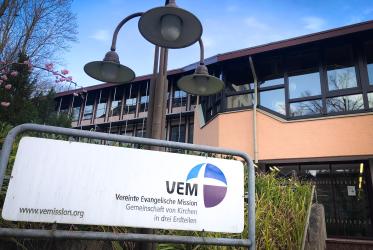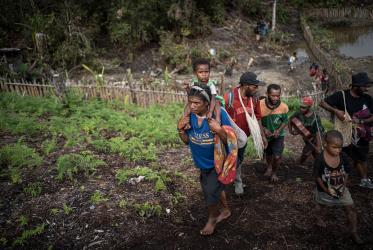Oral intervention by Salpy Eskidjian to the plenary, New York, 16 July 2001.
Thank you Mr. Chairman. I am pleased to address you from the perspective of a worldwide faith community. Like others of the world's many faith groups woven into the fabric of human societies, the World Council of Churches speaks out of local and global realities. On a daily basis local churches, as well as mosques, synagogues, temples and other local religious ministries, attend to the victims of gun violence. We witness first-hand the impact of endemic poverty, human rights abuses, and political exclusion on people in their homes and communities, and we understand why some are driven to seek security through guns.
In our global role, speaking on behalf of a worldwide fellowship of churches, we put before you one primary and urgent appeal - that the final document of this conference acknowledge that unless the overwhelming insecurities of people are effectively addressed, the heavy demand for small arms and light weapons will continue to frustrate even the best efforts to control them.
As the UN Experts Groups noted in its 1997 report, when states lose control over essential security functions and fail to maintain the basic human security of their citizens, the subsequent growth of armed violence, banditry and organized crime increases the demand for weapons by citizens seeking to protect themselves and their property (see A/52/298, para. 42). Such demand is obviously and especially strong in the world's many ongoing armed conflicts, but it is also disturbingly present in urban communities of the global north, as well as the south. And the only means of reducing that demand for weapons is through social, political, and economic change that creates other options and offers genuine protection to people. The pursuit of such change must engage a range of peacebuilding, development, governance, and social justice imperatives.
The centrality of demand reduction to the prevention of illicit gun use and trading is inadequately reflected in the draft Program of Action in L 4 (Rev. 1). paragraph 20 of the Preamble outlines broadly the means by which states intend to "prevent, combat and eradicate the illicit trade in small arms and light weapons," and it would be significantly strengthened by the addition of a sub-paragraph on demand reduction. We offer the following formulation, drawing in part on the Bamako Declaration of 2000, for your consideration:
"Recognizing that to address the problem of the illicit trade in SALW (Small Arms and Light Weapons) in all its aspects in a comprehensive, integrated, and sustainable manner, it is necessary to reduce the demand for weapons through measures that promote the strengthening of democracy, respect for human rights, the rule of law and good governance, as well as economic recovery and equitable growth, and other measures such as reform of the security sector and programmes to reverse cultures of violence and to create cultures of peace."
We also urge that the Programme of Action emerging from this conference specifically acknowledge that demand reduction efforts require new and extensive infusions of resources, and here we urge that the commitment of states to render assistance (contained in Section III, paragraph 3) be strengthened by including the appeal, contained in the Nairobi Declaration of 2000, for: "increased international support for programmes and initiatives that advance human security and promote conditions conducive to long-term peace, stability and development".
Churches and other faith communities are especially aware that the extraordinary humanitarian problems posed by small arms and light weapons cannot be solved by states on their own. We stand ready to work in partnership with governments and other elements of civil society to reduce demand for, and enhance control of, small arms and light weapons as one key step toward achieving true human security.
Humanitarian Statement of Concern addressed to the Conference by the CCIA and other members of IANSA (International Action Network on Small Arms), New York, 9-20 July 2001
1. Humanitarian, human rights, health and development workers witness the devastating effects of small arms proliferation on civilians all over the world. Providing relief to refugees and civilians displaced by war, facilitating development projects and the provision of medical services, mediating for humanitarian access and ensuring respect for human rights often place our organisations at the frontlines. These experiences have led us to believe that the uncontrolled proliferation and misuse of small arms and light weapons have contributed to a global humanitarian crisis - a crisis which results in approximately 500,000 deaths a year.
2. The proliferation of small arms and light weapons adds another unpredictable and lethal dimension to the activities of organisations dedicated to human rights, humanitarian, health and development work. The ability of workers to undertake their duties is increasingly constrained due to the threat and use of small arms, as many are kidnapped, assaulted and deprived of their liberty under the threat of a gun.
"More and more I am frightened to travel to the field. By air we go - small aircraft... by road, the risk of death and rape is very high. The worries before and during travel will leave a permanent impact on my health - long after I have left organisation X. I can't cope anymore."
Humanitarian worker, Uganda, 2000
3. The UN Conference on the Illicit Trade in Small Arms and Light Weapons in All Its Aspects provides governments with an historic opportunity to set high common standards and policies to address this scourge.
4. The right of states to buy and sell weapons for purposes of self-defence brings with it important responsibilities, including to respect and ensure respect for international human rights and humanitarian law. All too often in the past, the transfer of weapons to abusive military, paramilitary, security and police forces, whether arranged by arms brokers or directly by governments, has violated this obligation. The consequences have been devastating for millions of civilians around the world.
"There were about 12 of them all carrying Kalashnikov rifles with their faces covered. They asked us to give them our daughter. We refused to give her to them... One of them lifted his Kalashnikov and shot my daughter in front of our eyes. She was only 20 and was just about to finish high school."
Abbas Fiaz, "Afghanistan: Atrocities against civilians", in Common Grounds: Violence Against Women in War and Armed Conflict Situations, 1998
5. Factors leading to the demand for small arms are multiple and complex and are related to problems of poverty, underdevelopment, human rights abuse, insecurity and injustice. Our organisations have long committed themselves to alleviating these realities. However, this work is undermined by the easy availability and violent misuse of small arms and light weapons.
6. Small arms and light weapons are almost all produced legally, often then moving through a series of legal or illegal hands. The UN Conference must examine all aspects of this flow, and governments must agree to create control mechanisms that meet their responsibilities - to their own citizens, to civilians around the world and to the international community.
7. We therefore call on all governments to take assertive and coordinated action to:
- stop the supply of small arms and light weapons to those who use them to violate recognised standards of international human rights and humanitarian law; and
- address the human suffering caused by the millions of weapons in circulation.
The results of this Conference will be judged by the degree to which they contribute to the safety, dignity and well-being of those who live under the shadow of armed violence.





